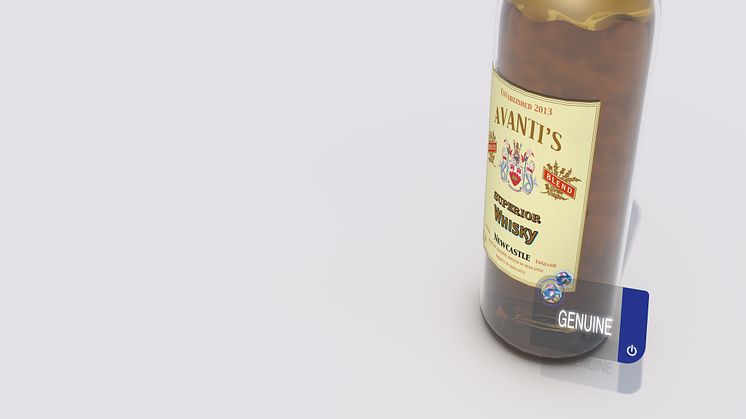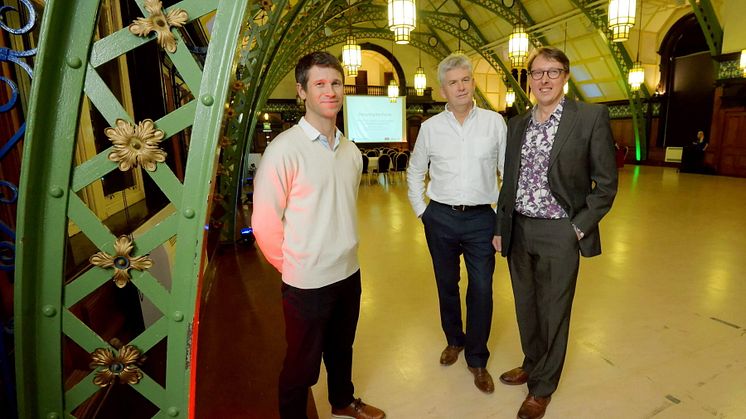
Press release -
Design students collaborate with industry innovators
A homecare medication box that senses and reminds the user when it is time to take their medicine, electronic sensors embedded in containers that detect whether home-cooked food is safe to eat, and counterfeit-detecting smartcards are just some of the commercial uses that Northumbria students have designed for a new technology called printable electronics.
MA Design and Design Management students have collaborated with The Centre for Process Innovation (CPI) to promote the benefits of printable electronics – electronics made using low cost, high volume printing processes instead of the traditional expensive, high energy manufacturing technologies used to produce silicon chips.
Printable electronics can be used to embed sensing capabilities into products without using wires, enabling touch sensitive switches and targeted bio-sensing. The technology can also be used to create low cost, thin, flexible and interactive printed displays and interactive packaging.
CPI challenged the student designers to identify where the emerging technology of printable electronics could be used to enhance and improve everyday consumer products. Some of the product concepts were presented by the students to more than 500 attendees at the annual Media Marketplace 2013 conference and exhibition in Leeds.
MA Automotive Design student Marc Holliday was team leader for the group that designed the Anti-Counterfeit Card. The thin-screen card contains an encrypted near field communication (NFC) chip. To check whether a product is genuine, the user places the encrypted NFC logo on to a similar logo on the packaging of the product. This activates the card, causing the word ‘genuine’ to appear on the face of the card, signifying that the item is not a counterfeit.
Marc said: “We found that up to eight per cent of the world’s total trade is subjected to counterfeiting, which equates to a loss of around $512bn annually from legitimate trade. Our solution was to harness the technologies from CPI in order to combat this issue. We have come up with an easy and effective solution towards the problem of counterfeiting.
“Every person who came to our stand was extremely interested in our ideas as they had never thought that printed electronics could be used in such innovative ways.”
Dr Stuart English, programme leader for MA Design and MA Design Management, said: “We are delighted to be collaborating with the UK’s national centre for printable electronics. Our students have used their creative thinking skills to innovate new and valuable applications for this cutting-edge technology.
“This is a great opportunity for students to put their design knowledge into practice in a new and largely unexplored field.”
CPI is the UK’s national printable electronics centre and is part of the government’s elite High Value Manufacturing Catapult network – seven technology and innovation centres that will be the catalyst for the future growth and success of manufacturing in the UK. Focused on the commercialisation and scale-up of printable electronics, CPI works with its clients to develop new innovative printable electronics applications for key manufacturing sectors.
Alan McClelland, Commercial Manager at CPI, said: “The work between CPI and Northumbria University used design to show the potential benefits of an exciting emerging technology area in printable electronics. The project really did bring together the strengths and expertise of both organisations to create innovative product concepts which not only have market demand but are also technology viable.”
Future work between CPI and Northumbria University Design will explore the potential for digital fabrication techniques to develop prototypes and potential manufacturing opportunities.
Date posted: June 3, 2013
Topics
Categories
Northumbria is a research-rich, business-focussed, professional university with a global reputation for academic excellence. To find out more about our courses go towww.northumbria.ac.uk
If you have a media enquiry please contact our Media and Communications team at media.communications@northumbria.ac.uk or call 0191 227 4571.








